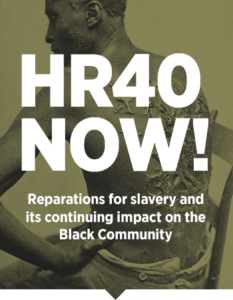|
Getting your Trinity Audio player ready...
|
Reading Time 7 mins
Juneteenth: A Special Case for Reparations
The past is not past. And slavery is not just the past. African American communities are still enslaved today because many still suffer from the long-term social–economic effects of slavery, directly and indirectly.
Juneteenth, Emancipation, and African American Day is a federal holiday honoring the end of chattel slavery in the United States after the Civil War. June 19 commemorates the day in 1865 when the U.S. Army issued General Order No. 3, transmitted the Emancipation Proclamation to the enslaved people of Texas, stating for the record that they should have been freed from slavery over two years prior in the Emancipation Proclamation of 1862.
 Apart from the two and a half years leading up to Juneteenth, the Thirteenth Amendment’s purpose of officially ending slavery throughout the United States was also deferred. The long-term economic impact and social constraints of systemic racism scarred the road to freedom.
Apart from the two and a half years leading up to Juneteenth, the Thirteenth Amendment’s purpose of officially ending slavery throughout the United States was also deferred. The long-term economic impact and social constraints of systemic racism scarred the road to freedom.
The history of Juneteenth, African enslavement, and, naturally, the deferred freedom that Juneteenth is symbolic of is filled with heroes, plots, and interesting twists. Like the African American experience, Juneteenth celebrates pain, joy, and sadness. Exclamation and question.
From state recognition over the decades, beginning with Texas in 1980 and Florida in 1991, Juneteenth continued to gain increased recognition and observance throughout the United States.
Gaining greater support in the atmosphere following the death of George Floyd, the Juneteenth legislative push culminated in the passing of the Juneteenth National Independence Day Act on June 17, 2021. This historic legislation established June 19 as a federal holiday, making it the first new federal holiday since Martin Luther King Jr. Day in 1983.
Ironically, Texas and Florida pioneered the state recognition efforts. This history presents an interesting paradox when the present political climate in these states regarding issues of African American equality is considered. Examples are the anti-‘woke’, Critical Race Theory paranoia etc. of Florida’s Governor Ron DeSantis and the xenophobic sentiments from some Texan officials. Looking through the rearview mirror may give us a glimpse of hope for the possibilities of other issues that are seemingly unimaginable at present, such as reparations for the deferment that Juneteenth represents, as well as the wider quest for reparations across the Americas, including the United States.

Though no photo of Henrietta Wood exists, her story is recorded in court filings, including the verdict slip above. Illustration by Cliff Alejandro; Source material: W. Caleb McDaniel (NYPL)
Many see the victory of the Juneteenth national holiday as symbolic reparations. The 1870 case of Henrietta Wood (Wood v. Ward) may be instructive to us as we think of Juneteenth in the context of reparations. Henrietta Wood (1818-1912) was an enslaved woman from Kentucky who moved to Ohio in 1848 when her enslaver migrated there. Wood was given papers in Ohio that stated “she was a free slave,” and it was her first time as a free woman in a free state. She was, however, kidnapped and eventually brought to Texas, where she remained enslaved even after the Civil War and the signing of the Emancipation Proclamation.
She eventually sued her former owners for $20,000 in reparations. Henrietta won her case, receiving $2,000, the largest restitution awarded by a US court to a formerly enslaved person. Although this sum was far less than the $20,000 in reparations against the man that kidnapped and sold her back into slavery, it was a significant victory.
Henrietta’s story had long set a moral standard regarding what enslaved people and their descendants are owed for slavery and its aftermath. So although reparations have become one of the most hotly contested topics in American politics over the past two decades, it is not a new issue. The issue of reparations for the immorality (and degradation) of slavery was echoed long before “emancipation” itself!” Enslaved people who had gotten their freedom began trying to sue for compensation for their enslavement, even during slavery.
Some academics advance that the descendants of Blacks held as slaves in Texas are entitled to reparations for the extra two and a half spent in direct slavery after they were supposed to be free. Such proponents see enslavement and denial of freedom after the Federal government outlawed enslavement as false imprisonment. Several states in the union offer compensation to those who were forcibly ‘imprisoned,’ California and Texas being examples.
Heroic figures have championed reparations throughout the centuries. In the 18th century, ex-slave Callie House (1861-1928) was an activist on this issue seventy years before the Civil Rights Movement demanding reparations for the formerly enslaved.
 In the 1950s and 1960s, Queen Mother Moore (1898-1997) was the best-known advocate of African-American reparations. Through her Harlem-based organization, the Universal Association of Ethiopian Women, Moore actively promoted reparations from 1950 until her transition. And, inspired by the teachings of Marcus ‘Mosiah’ Garvey, rastafari have played a seminal role in popularizing reparations demands through its ‘reasonings’ and through reggae.
In the 1950s and 1960s, Queen Mother Moore (1898-1997) was the best-known advocate of African-American reparations. Through her Harlem-based organization, the Universal Association of Ethiopian Women, Moore actively promoted reparations from 1950 until her transition. And, inspired by the teachings of Marcus ‘Mosiah’ Garvey, rastafari have played a seminal role in popularizing reparations demands through its ‘reasonings’ and through reggae.
The modern reparations movement has been inspired undoubtedly by the successful reparations struggles of other groups in America and world societies since the end of WWII. Foremost is the widely publicized reparations payments made to individual Jewish people and the state of Israel, including from the United States, via the Marshall Plan, which helped to ensure that Jewish victims received reparations for the Holocaust, including making various investments over time.
In 1952, West Germany agreed to pay 3.45 billion Deutsche Marks to Holocaust survivors. Some Native Americans have received land and billions of dollars for various benefits and programs for being forcibly exiled from their US native lands.
In 1892, families of 11 Italian immigrants who were lynched received payments from the federal government. For Japanese Americans, $1.5 billion was paid to those interned during World War II. So there is precedent for HR 40 and other reparations initiatives targeted at the Federal and State governments of the United States and societies that have experienced Transatlantic Chattel Slavery (TCS).
African Americans throughout the Americas, and Black American descendants of the TCS, as a group, are the only group that has not received reparations for state-sanctioned racial discrimination. At the same time, slavery afforded some families in the United States and across the Americas the ability to accrue tremendous wealth. But there are signs of a turning point in this cause. Various events occurred across the Atlantic world over the decades, moving closer to some kind of reckoning.
Sponsored by Representative John Conyers, H.R.40, a bill introduced in the 116th Congress (2019-2020) has as its main objective the establishment of a Commission to Study and Develop Reparation Proposals for African-Americans. Although it has languished in Congress for over 30 years, there is a push for President Joseph Biden to sign an executive order so that the commission can be up and running before the end of Biden’s first term presidency.
In the Caribbean, the Caricom Reparations Commission and its 10 points demands of repair for the Transatlantic Chattel Slavery set a dialogue framework with former slave-trading European nations.
In Brazil, a 2003 Federal Decree recognizes any community that designated itself as Afro-descendant with a successful application for the status of quilombo would receive a collective land deed. This effectively creates a program of reparations for slavery for all Brazilians of African descent living in predominantly black communities and even urban areas.
In December 2022, Dutch Prime Minister Mark Rutte apologized on behalf of the Netherlands’ Government for its role in slavery and the slave trade. Though lacking in concrete plans for repair and reparations, the government established a $212 million fund for initiatives to help tackle the legacy of slavery in the Netherlands and its former colonies and to boost education about the issue.
In February 2022, members of the Trevelyan aristocratic British family went to Grenada in Feb this year to publicly apologize for their ancestors’ ownership of more than 1,000 enslaved Africans on that Caribbean island and promise £100,000 in reparations as a start. The apology was signed by 104 descendants of part owners of six Grenadian plantations.
A Chicago suburb in Evanston, Illinois, became the first city to make repa rations available to Black residents through a $10 million housing project in 2021. And only last week, New York State New York passed a bill that would create a commission to consider reparations to address the lingering, negative effects of slavery in the State, although the New York State Legislature had enacted a statute giving freedom to enslaved Africans in 1817, it wasn’t implemented until ten years later.
rations available to Black residents through a $10 million housing project in 2021. And only last week, New York State New York passed a bill that would create a commission to consider reparations to address the lingering, negative effects of slavery in the State, although the New York State Legislature had enacted a statute giving freedom to enslaved Africans in 1817, it wasn’t implemented until ten years later.
Similarly, a California bill was signed into law in 2020. Touting California as the first state to study reparations, [T]he bill seeks corrective measures to redress “the structural racism and bias built into and permeating throughout [the state’s] democratic and economic institutions.”
Juneteenth, signed into law, the first holiday to be added to the list of federal holidays since the recognition of Rev. Dr. Martin Luther King, Jr’s birthday in 1983, fits into this growing reparations momentum.
Juneteenth symbolizes the deferment of freedom and represents the plight and the quest for freedom and equality of Black people in the post-slavery context period.
Freedom is a constant struggle!
Happy Juneteenth!
#juneteenth
#reparations
#blackhistoryfacts
#blackhistoryisamericanhistory
This article is an extended version of Martin Felix‘s presentation at the New York State Union of Teachers (NYSUT) June 19 event in celebration of Juneteenth, under the theme: “Juneteenth – Reflections on History, the Reparation Momentum, and the Fight to Defend Black Education”. nysut.org/manythreads.
